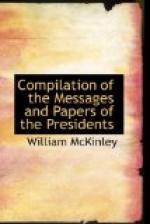At present American shipping is under certain great disadvantages when put in competition with the shipping of foreign countries. Many of the fast foreign steamships, at a speed of fourteen knots or above, are subsidized; and all our ships, sailing vessels and steamers alike, cargo carriers of slow speed and mail carriers of high speed, have to meet the fact that the original cost of building American ships is greater than is the case abroad; that the wages paid American officers and seamen are very much higher than those paid the officers and seamen of foreign competing countries; and that the standard of living on our ships is far superior to the standard of living on the ships of our commercial rivals.
Our Government should take such action as will remedy these inequalities. The American merchant marine should be restored to the ocean.
The Act of March 14, 1900, intended unequivocally to establish gold as the standard money and to maintain at a parity therewith all forms of money medium in use with us, has been shown to be timely and judicious. The price of our Government bonds in the world’s market, when compared with the price of similar obligations issued by other nations, is a flattering tribute to our public credit. This condition it is evidently desirable to maintain
In many respects the National Banking Law furnishes sufficient liberty for the proper exercise of the banking function; but there seems to be need of better safeguards against the deranging influence of commercial crises and financial panics. Moreover, the currency of the country should be made responsive to the demands of our domestic trade and commerce.
The collections from duties on imports and internal taxes continue to exceed the ordinary expenditures of the Government, thanks mainly to the reduced army expenditures. The utmost care should be taken not to reduce the revenues so that there will be any possibility of a deficit; but, after providing against any such contingency, means should be adopted which will bring the revenues more nearly within the limit of our actual needs. In his report to the Congress the Secretary of the Treasury considers all these questions at length, and I ask your attention to the report and recommendations.
I call special attention to the need of strict economy in expenditures. The fact that our national needs forbid us to be niggardly in providing whatever is actually necessary to our well-being, should make us doubly careful to husband our national resources, as each of us husbands his private resources, by scrupulous avoidance of anything like wasteful or reckless expenditure. Only by avoidance of spending money on what is needless or unjustifiable can we legitimately keep our income to the point required to meet our needs that are genuine.
In 1887 a measure was enacted for the regulation of interstate railways, commonly known as the Interstate Commerce Act. The cardinal provisions of that act were that railway rates should be just and reasonable and that all shippers, localities, and commodities should be accorded equal treatment. A commission was created and endowed with what were supposed to be the necessary powers to execute the provisions of this act.




